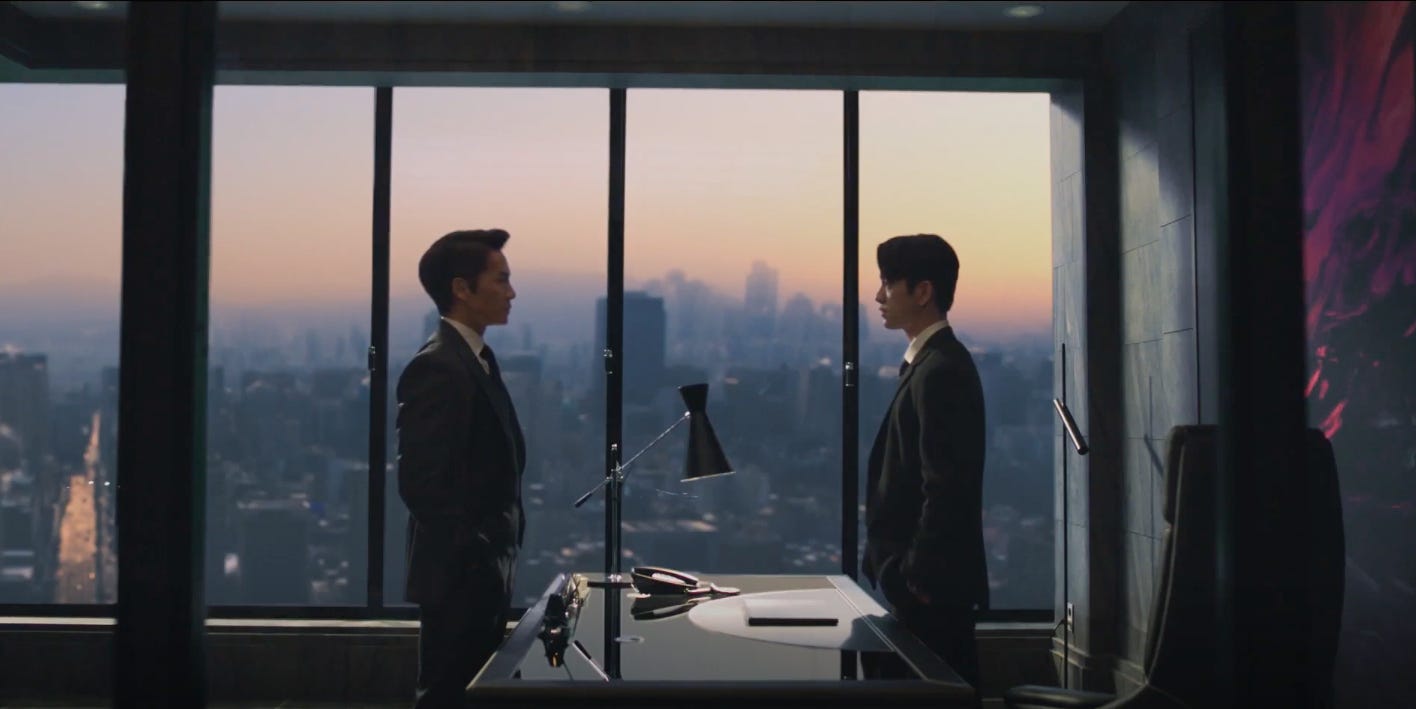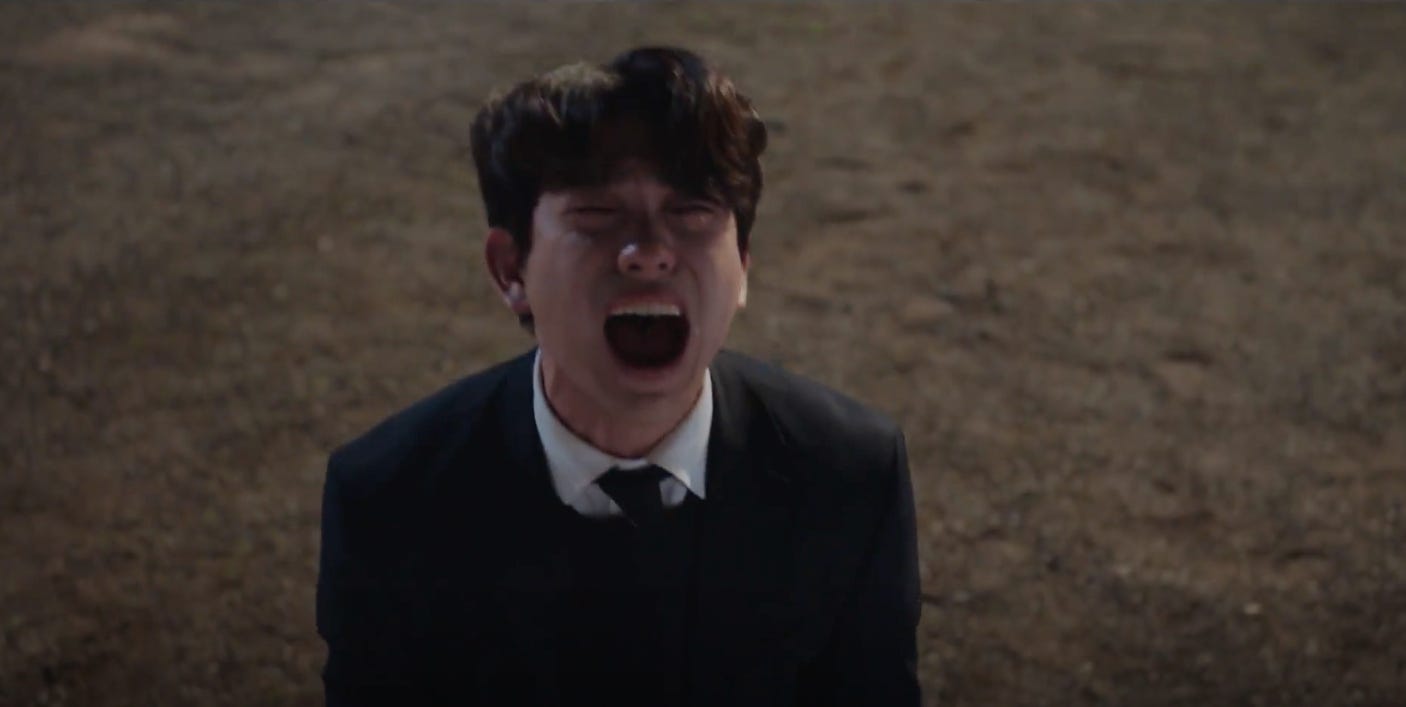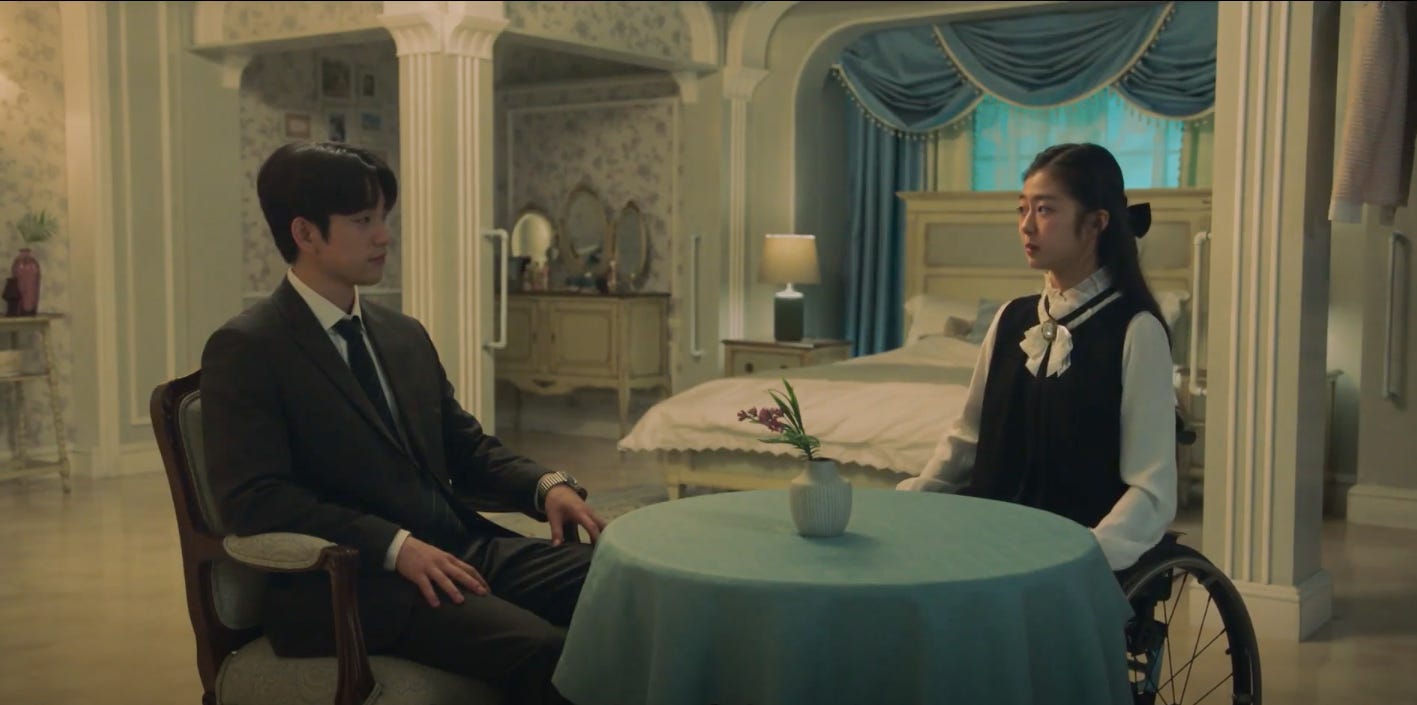The Devil Judge (2021) Episodes 5-8
Beware of spoilers…
There’s an eerie but evocative moment where Jung Sun-ah saunters down the aisle of as the new chair of the Social Reform Foundation and the watching audience are almost entirely decked in dark, muted colours. The iconography is immediately startling and suggestive. What follows in the form of the President’s speech confirms what this moment is meant to convey. It heralds a new era — one of an increasing authoritarian grip on a fractured society marked by a certain degree of lawlessness. In a performance of a lifetime the flamboyant head of state takes advantage of the public’s concern with corruption within the SFR and pontificates hysterically over his new law and order agenda. It’s a masterful moment of “wagging the dog” — misdirecting the media consuming public and turning their attention away from the real culprits by redirecting their ire against outsiders… as culprits of recent woes. It’s an ugly manifestation of nationalism that alludes to fascistic tendencies among the so-called elites. The irony is that to gain absolute control of the public space, they must first stoke the fires of public opinion to burn for their cause.
I am a fan of anything that brings something unique to the table in the arena of “politics is theatre”. Hence I’m enamoured with this show for that and other reasons. I’m in general agreement with Kim Ga-on that blame for the emergence of street vigilantism and the increasing grip of totalitarianism should not be laid on the shoulders of the televised trials as Min Jung-ho claims. The live court show may appear to make a mockery of the bedrock principles of justice such as the presumption of innocence. However, its popularity points to the fact that the conditions for it were already in place way before it was mooted. That is to say, the live court show could only ever occur because of the ineptitude or impotence of the judiciary compromised by political maneuvering in the background. Long before Kang Yo-han with his panache for the theatrical came along, something was already very rotten in Denmark. There were already rumblings of discontent among the populace with the law and order system. Certainly an argument can be made that the televised trials have exacerbated these issues and given some oxygen to dangerous fringe groups but the corrupt elites at the top who took captive of the institutions, laid the groundwork for what’s emerged. The fracturing of the society is a case in point. Although I wouldn’t go so far as to say that the likes of Min Jung-ho are culpable, they are part of the problem. Getting rid of the live court to my mind is essentially a band-aid solution which does nothing to address the actual problem. For Min Jung-ho to only just realise that this isn’t the country he once fought for means that he has been asleep at the wheel all this time.
Despite the fact that agent provocateur Kang Yo-han appears to be an agent of chaos, he at the very least understands what the fundamental issues are. He calls it the self-pity of the powerful and the word “hypocrisy” gets thrown around a fair bit. While he enjoys inherited wealth himself, being an unwanted illegitimate child gave him unique insight into what the rich and powerful are like when the cameras are switched off. The following of helpers that he has gathered around him is proof positive that despite the cloak of machiavellian expediency he wears in front of, he is at the very least intelligent enough to know that he needs people of conviction around him. People with firsthand experience who have lost faith in the system. Ga-on calls it “resentment and anger” but what it is, is that they are fed up to the teeth that the offenders get off with a slap on the wrist or worse still, with murder. The legal system appears to have one rule for the elites and one for the plebs. Some like the ironically named Minister of Justice Cha Kyung-hee use the privileges of their position to circumvent the laws to feather their personal coffers. It’s an unjust world and to a large extent, Yo-han is the finger that points that out.
It’s also clear why Yo-han has sidelined Oh Jin-joo the other associate judge on the bench. There’s little doubt that she’ll end up being a liability one way or another. She’s always been starry-eyed and easily dazzled. She doesn't have strong convictions one way or another about the effectiveness or workings of the law. A person like that has a tendency to be wishy washy, chasing the next shiny thing when the previous one loses its lustre. Ga-on on the other hand, was adversarial from the start from convictions and Yo-han knew he would always have clarity with Ga-on either as friend or foe.
This is perhaps why we root for Yo-han. He might not be wholly trustworthy but the devil judge gets it. His motives might not be pure nor might he be concerned with weighty matters of justice. At least he makes no pretensions in that regard. In a likelihood this is all just about revenge for him. That’s why he cynically calls it a game — a contest between him and the levers of power that he’s trying to take down because he doesn’t know what he himself believes or whether he himself believes in anything any longer. Except family. That he understands because of Isaac and Elijah. So if nothing else perhaps he wants justice for them.
Family is a powerful clarion call for Ga-on who lost his as a teenager. Like Bruce Wayne and Dick Grayson before him, he lost his to criminals of one type or another. Mum and Dad didn’t even know what hit them and didn’t even live to see the swindler get caught only for their son to find out years later that the man that broke their family apart, got off scot free. Ga-on perceives that about Yo-han and no doubt he feels the pull of being part of a family. He has always understood his own brokenness and suppressed inner rage which is why he has never thought himself worthy of Soo-hyun to say “yes” to her for fear it is all out of pity that she tethers herself to him. What Yo-han offers him, however, is not compassion or even healing but understanding as fellow travellers as well as a family of like-minded folk. The need for him to lash out that Soo-hyun and Jung-ho can’t really empathize with as willing cogs in the system. Whatever tug-of-war is raging within has been brewing for years and only repressed because of the belief that the law works. Yo-han doesn’t tell Ga-on anything he doesn’t already know and he isn’t that amenable to being manipulated by Yo-han anyway. Ga-on isn’t red-pilled as much as Yo-han confirms what he’s always suspected. What can’t be denied are the facts that the system has been hijacked by the wrong types of people who couldn’t care less about the inequities that result. Equality before the law is a myth and the man or woman on the street caught in the crossfire know that better than anyone else.








